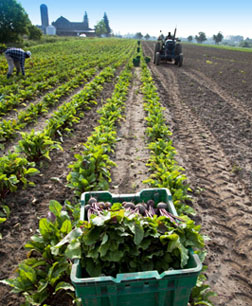Is razor-thin Liberal majority most likely Ontario election result now .. before leaders’ debate?
Sep 27th, 2011 | By Randall White | Category: In Brief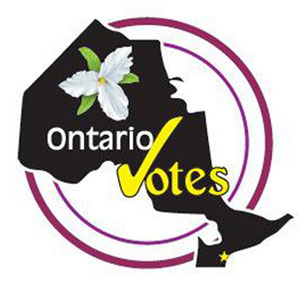 With debates last night (French – well sort of, at any rate) and tonight (English), and the actual vote now a mere nine days away, you might think the outcome of the October 6 Ontario provincial election is a little clearer than it used to be. And you would be at least partly right.
With debates last night (French – well sort of, at any rate) and tonight (English), and the actual vote now a mere nine days away, you might think the outcome of the October 6 Ontario provincial election is a little clearer than it used to be. And you would be at least partly right.
As recently as early last month the Globe and Mail was reporting: “Ontario Tories hold 10-point lead as fall election approaches.” The provincial electorate at this point still seemed guided by strong memories of the May 2 federal election, when the Harper Conservatives took more than 44% of the Ontario vote, compared with (in round numbers) 26% for the Jack Layton New Democrats, and a mere 25% for the hapless Ignatieff Liberals.
By the middle of this month, however, it had become clear that the initial big Tory lead in Ontario provincial politics was not holding. On September 14 I was reporting myself :Â “Before non-Tory partisans get too excited about such headlines as “Ontario voters trending to [Liberal leader and current premier Dalton] McGuinty, poll suggests” (Globe and Mail) or “Liberals inch ahead of Tories in two new polls” (Toronto Star), they might want to at least consider “Tories leading the pack: Poll” (surprise, surprise – in the Toronto Sun).”
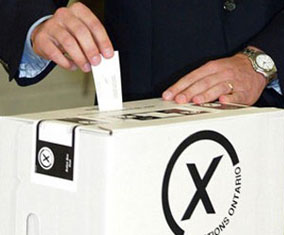 Less than two weeks later, the vote for Tim Hudak’s Ontario Conservatives remains competitive. But Premier McGuinty’s Liberals have without doubt caught up. Just this past Saturday, the Toronto Star announced that “Ontario is headed toward a minority government for the first time in decades with the Liberals and Progressive Conservatives deadlocked, according to a major new poll … A Forum Research survey of 40,750 people – one of the largest polling samples in Canadian political history – has the two parties separated by only 107 respondents, each holding 35 per cent. (14,064 said they will vote Liberal, while 13,957 selected the Conservatives.) Meanwhile, the New Democrats were at 23 per cent and the Green Party at 5 per cent.”
Less than two weeks later, the vote for Tim Hudak’s Ontario Conservatives remains competitive. But Premier McGuinty’s Liberals have without doubt caught up. Just this past Saturday, the Toronto Star announced that “Ontario is headed toward a minority government for the first time in decades with the Liberals and Progressive Conservatives deadlocked, according to a major new poll … A Forum Research survey of 40,750 people – one of the largest polling samples in Canadian political history – has the two parties separated by only 107 respondents, each holding 35 per cent. (14,064 said they will vote Liberal, while 13,957 selected the Conservatives.) Meanwhile, the New Democrats were at 23 per cent and the Green Party at 5 per cent.”
* * * *
Prospects of this sort have for some time now been raising dreams (some would say nightmares?) of the 1985 Liberal-NDP Accord, that finally ended the long 42-year reign of the old “Red Tory” Ontario Progressive Conservative dynasty at Queen’s Park.
I cannot resist noting that my own variation on this theme in these electronic pages dates back to August 25, with “Maybe there’ll be a dreaded ‘coalition’ in Ontario after October 6 vote?” For more recent mainstream media commentary see Martin Regg Cohn in this past Saturday’s Toronto Star: “A balancing act for NDP’s Andrea Horwath … Playing coy remains a risky strategy now, as voters wonder about her price for propping up a minority government in the Legislature after Oct. 6.”
Meanwhile, yesterday’s Globe and Mail featured yet another variation on the theme from the ubiquitous Éric Grenier, in “Neck-and-neck Ontario race favours McGuinty three weeks in.” Mr. Grenier’s latest “weighted aggregation of the most recent polls” suggests that the slenderest of Liberal majority governments might also lie latent in current trends. This sees the Hudak Conservatives with 35.4 % of the province-wide popular vote, compared with 34.9% for the McGuinty Liberals and 23.4% for Ms. Horwath’s New Democrats.
But as a result of what the estimable Graham Murray would call the greater “efficiency” of the Liberal vote, the most likely scenario generated by Mr. Grenier’s “ThreeHundredEight.com … seat projection model” gives the Liberal 55 seats in the Legislative Assembly, compared with only 32 seats for the Conservatives and 20 for the New Democrats. (And, as fans of the ultimate political arithmetic may recall, the barest majority in the current 107-seat legislature is 54.)
* * * *
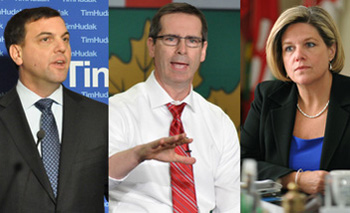 A very bad performance by Premier McGuinty in tonight’s English language debate – and/or very good performances by one or the other or both of Mr. Hudak and Ms. Horwath – just might dramatically upset these current trends. And as a colloquium of “eight of Canada’s leading pollsters” in Ottawa last week underlined, the 2011 polling track record in Canadian elections itself has so far been much less than perfect.
A very bad performance by Premier McGuinty in tonight’s English language debate – and/or very good performances by one or the other or both of Mr. Hudak and Ms. Horwath – just might dramatically upset these current trends. And as a colloquium of “eight of Canada’s leading pollsters” in Ottawa last week underlined, the 2011 polling track record in Canadian elections itself has so far been much less than perfect.
So the most sober and safest prediction for October 6 right now is no doubt that the outcome is still a big question mark. (Except that there is unlikely to be any kind of NDP-led government, unless the current polls are altogether dramatically wrong. Tim Hudak may yet wind up as a Conservative Ontario premier – even if only briefly. But voters in Canada’s most populous province are not quite ready to throw their provincial Liberals overboard, in favour of Ms. Horwath’s New Democrats, who sometimes seem almost as much against taxes as Mr. Hudak’s sometimes purple but almost always non-red Tories.)
Adam Radwanski’s piece in last Friday’s Globe and Mail, on “Why it’s not so bad if this is the last televised Ontario leaders’ debate,” could lend tonight’s show a certain historical interest as well. As he reports: “It’s a poorly kept secret that some television networks were reluctant to devote an hour-and-a-half of prime time during this fall’s campaign to a commercial-free debate between provincial politicians. Ultimately, the broadcasters’ consortium — which includes CBC, CTV, Global, Sun News Network and TVOntario — settled on an early-evening slot nine days before the election … But people who were close to the negotiations have speculated that the networks won’t play along again next time.”
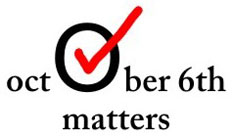 I don’t quite know what to think about this myself. From one angle, it just aids and abets the no-one-is-really-interested-in-Ontario-politics-anymore scenario that has been so influential in local high places for a number of years now. And, like at least a few others in the province today, IÂ find this distressing. On the other hand, the vision of the regional future in Mr. Radwanski’s second-last paragraph may make more sense: “Freed from the strange sort of monopoly that currently exists, broadcasters that actually want to cover elections in prime time –Â the TVOntarios and CP24s of the world – could try to lure the leaders more often. And voters who were interested in learning more about their options would have [a] greater chance to do so.”
I don’t quite know what to think about this myself. From one angle, it just aids and abets the no-one-is-really-interested-in-Ontario-politics-anymore scenario that has been so influential in local high places for a number of years now. And, like at least a few others in the province today, IÂ find this distressing. On the other hand, the vision of the regional future in Mr. Radwanski’s second-last paragraph may make more sense: “Freed from the strange sort of monopoly that currently exists, broadcasters that actually want to cover elections in prime time –Â the TVOntarios and CP24s of the world – could try to lure the leaders more often. And voters who were interested in learning more about their options would have [a] greater chance to do so.”
* * * *
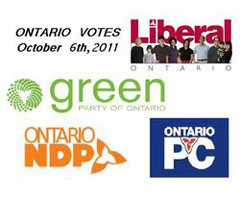 Something of this vision may have already arrived in last night’s “Premier débat électoral en français à TFO” – the French incarnation of TVOntario. This “first French-language Ontario election debate” did not involve provincial party leaders, at least partly for the good enough reason that not all of them are capable of surviving such an event “entirely in French.” (Just last month Tim Hudak “couldn’t answer a question put to him in French.”) Instead the show involved “representatives of Ontario’s three main political parties … Gilles Bisson of the New Democratic Party, Jason MacDonald of the Progressive Conservative Party, and Madeleine Meilleur of the Liberal Party,” nicely moderated by TFO journalist Gisèle Quenneville.
Something of this vision may have already arrived in last night’s “Premier débat électoral en français à TFO” – the French incarnation of TVOntario. This “first French-language Ontario election debate” did not involve provincial party leaders, at least partly for the good enough reason that not all of them are capable of surviving such an event “entirely in French.” (Just last month Tim Hudak “couldn’t answer a question put to him in French.”) Instead the show involved “representatives of Ontario’s three main political parties … Gilles Bisson of the New Democratic Party, Jason MacDonald of the Progressive Conservative Party, and Madeleine Meilleur of the Liberal Party,” nicely moderated by TFO journalist Gisèle Quenneville.
My own ability to comprehend debates entirely in French (without the instantaneous translation provided to English language stations in federal elections) is rudimentary at best. But I did watch most of last night’s event on TFO. And I thought it was impressive enough. Thanks to the marvels of modern technology, viewer’s reactions sent to the TFO website were also intermittently flashed across the screen. (And I usually read French better than I hear it.)Â I think I broadly agreed with the viewer who urged that Madeleine Meilleur (aka Dalton McGuinty’s Minister of Community and Social Services) dominated the action.
But Gilles Bisson was certainly a worthy opponent. And Jason MacDonald seemed the least comfortable in French but stood up for his party gallantly nonetheless. (He was hampered as well, perhaps, by recent reports elsewhere that: “Tim Hudak has walked away from francophones in Ontario but this isn’t anything new to the PC Party … Earlier this month, Hudak said that he would look to cut French language services to achieve his savings target and help fill the $14 billion hole in his platform.”)
There was also a Northern Ontario debate last week (in English), which Premier McGuinty chose not to attend. (See, eg, “Leaders take aim at absent McGuinty in Northern Ontario debate.”) How much of a problem this may prove for the McGuinty Liberals seems unclear. They already have a track record of some credibility in the north. Even if you lived in the region, the only way you could watch the debate was “in-person or on a web-cast.” And the sad but true demographic reality is that while Northern Ontario takes up the lion’s share of the province’s impressive modern geography, it accounted for only 6.1% of the population in 2010, currently projected to drop further to 5.1% by 2026.
* * * *
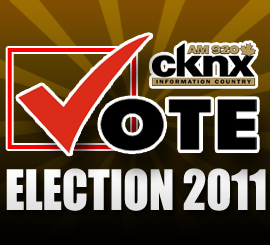
“CKNX will be providing coverage of the Provincial Election campaigns in Midwestern Ontario. Stay tuned to CKNX AM920 ... for more Election 2011 updates” – in Huron Bruce, Bruce Grey Owen Sound, and Perth Wellington.
Finally, in tonight’s only English language debate on mainstream-media TV, 6:30 pm to 8:00 pm, some are wondering whether any of the three major party leaders will be seriously digging into what are widely regarded in certain expert quarters as the quite grim economic and financial prospects facing Canada’s most populous province in the near enough future. (See, eg, “In Ontario, a refusal to face the fiscal facts.”)
The moderator, Steve Paikin, host of TVO’s The Agenda – and/or the “viewer questions” which will play a role in structuring the debate – may well raise some version of all this. But I think it is just naive myself to expect our political leaders to respond in any detail. And I don’t see it as all that important either.
Most of we mere voters do already understand very well that our regional economy and its attendant public finances – along with various national and international economies in many parts of Marshall McLuhan’s global village – are in some real difficulty. And, insofar as such judgments are ever at all possible, we are capable of judging just how our various competing political leaders might respond if and when things get very bad indeed, by reading between the lines of what they feel comfortable saying in public right now.
(At the same time, I also very much agree that all our public debates in 2011 would be more sensible – and useful, if the current de facto ban on talking in public about raising taxes could somehow be lifted from our collective shoulders!)

